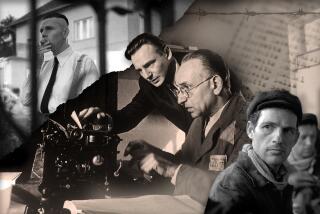MOVIE REVIEW : âKorczakâ a Triumph of Dignity, Style
If ever there were a candidate for sainthood it is the man known as Dr. Janusz Korczak, an enduringly influential pioneer in the cause of children and their rights, who has been called the first actual pediatrician. His destiny was to care for 200 orphans in the Warsaw Ghetto, surely one of the greatest challenges imaginable, an observation also applicable to anyone attempting to dramatize his later life on film.
âKorczakâ (at the Nuart through Tuesday), however, is but the latest triumph for Polandâs Andrzej Wajda, long regarded as one of the worldâs greatest directors for such films as âAshes and Diamondsâ and âMan of Marble,â to name only the two among his more than 30 pictures that are most familiar to American audiences.
The formidable, manifold task facing Wajda was above all to make Korczakâs fate an affirmation of life and of human dignity in the face of inevitable tragedy--and to resist sentimentalizing the children. In succeeding at evoking a genuine catharsis rather than merely depression, Wajda was strongly aided by two longtime colleagues, his writer Agnieszka Holland (now also an important director in her own right) and actor Wotjek Pszoniak, best known for his creepy, paranoid Robespierre in Wajdaâs 1982 âDanton.â
Hollandâs brilliant screenplay provides Pszoniak with a great role as Korczak, one with lines that at times soar like Shakespearean verse; exceptional English subtitles confirm what you can sense with your own ears. Their contributions are, in turn, further enriched by Robby Mullerâs high-contrast black-and-white cinematography that gives the film a documentary look (and allows in fact a near-seamless inclusion of German archival footage of the ghetto) and by Wojciech Kilarâs elegiac, exceedingly spare score.
âKorczakâ gets under way with a briskness, sprinkled with a welcome wry, absurdist humor, that is sustained throughout its near two-hour running time. It opens in 1936, the year Korczak is told he must suspend his popular radio program--even though it is called âThe Old Doctorâ to conceal the fact that he is a Jew. We hear Korczak remark that âwar is inevitable,â but still the Nazi occupation of Poland in 1940 arrives like a torrential flood, especially for Jews, who are almost immediately rounded up and secured in the Warsaw Ghetto.
Korczak moves his model orphanage into an old schoolhouse intended for only 100 children. He gets a taste of whatâs in store for him and his charges when a German soldier confiscates a truck load of potatoes intended to feed the orphans for two weeks and Korczak is brutally beaten when he protests. Yet he, his colleagues and the ghettoâs leaders can only gradually absorb the full magnitude of the implacable Nazi evil.
Although much of Korczakâs time and energy is of necessity devoted to scrambling for food for the children and his small staff, he nonetheless makes every attempt to run his institution along the lines expostulated in his many writings; some of his ideas were last year incorporated in the United Nationâs convention on the rights of children. (Korczak, in fact, was a nom de plume; the doctor was really Henryk Goldszmit, born in 1878.) This means that the children participate in a kind of self-government, even to the extent of holding a forum to criticize their teachers.
Even more extraordinary are the plays about death that Korczak eventually has the children stage so that they might see death as gentle and thus fear it less. From the very beginning of the Warsaw Ghetto, Korczak, due to his eminence and his many Gentile admirers, has numerous chances to escape but is shocked and indignant at the very suggestion that he should desert his children.
Thereâs a certain irony--and one hopes, gratification for Wajda and Pszoniak--in the making of âKorczak,â for 15 years ago Wajda was stung by charges of anti-Semitism when his epic satire of greedy and vulgar 19th-Century Lodz captains of industry, âLand of Promise,â in which Pszoniak played a nouveau riche Jew, was nominated for a foreign-film Oscar. Yet âKorczak,â a commercial failure in Poland, became a cause celebre when it opened in France, with Wajda attacked for not dealing specifically with Polish passivity and complicity in the fate of Polish Jews.
âI didnât expect the film could not be criticized,â said Wajda, who has wanted to make âKorczakâ (Times-rated Mature for adult themes and scenes of brutality) for many years. âBut you cannot question my good intentions.â
âKorczakâ
Wojtek Pszoniak: Korczak
Ewa Dalkowska: Stefa
Piotr Kozlowski: Heniek
Marzena Trybala: Estera
A New Yorker Films release. Director Andrzej Wajda. Producers Regina Ziegler, Janusz Morgensten, Daniel Toscan du Plantier. Executive producers Wolfgang Hantke, Lew Rywin. Screenplay Agnieszka Holland. Cinematographer Robby Muller. Editor Ewa Smal. Costumes Wieslawa Starska, Malgorzata Stefaniak. Music Wojciech Kilar. Production design Allan Starski. Set decorators Anna Kowarska, Magdalena Dipont. Sound Janusz Rosol. In Polish, with English subtitles. Running time: 1 hour, 57 minutes.
Times-rated Mature (for adult themes, scenes of brutality).
More to Read
Only good movies
Get the Indie Focus newsletter, Mark Olsen's weekly guide to the world of cinema.
You may occasionally receive promotional content from the Los Angeles Times.










